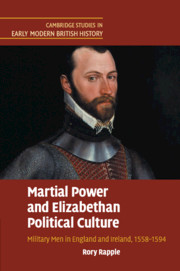Book contents
- Frontmatter
- Contents
- Acknowledgements
- List of abbreviations
- Notes on the text
- Political map of sixteenth-century Ireland circa 1534
- CAMBRIDGE STUDIES IN EARLY MODERN BRITISH HISTORY
- Introduction
- 1 Chimneys in summer
- 2 Martial men and their discontents
- 3 The limits of allegiance: English martial men, Europe and the Elizabethan regime
- 4 The captains and the Irish context
- 5 The limits of imperium: martial men and government
- 6 The limits of rhetoric: the captains and violence in Elizabethan Ireland to 1588
- 7 Unlimited indemnity: delegates versus viceroys
- Conclusion
- Bibliography
- Index
5 - The limits of imperium: martial men and government
Published online by Cambridge University Press: 02 July 2009
- Frontmatter
- Contents
- Acknowledgements
- List of abbreviations
- Notes on the text
- Political map of sixteenth-century Ireland circa 1534
- CAMBRIDGE STUDIES IN EARLY MODERN BRITISH HISTORY
- Introduction
- 1 Chimneys in summer
- 2 Martial men and their discontents
- 3 The limits of allegiance: English martial men, Europe and the Elizabethan regime
- 4 The captains and the Irish context
- 5 The limits of imperium: martial men and government
- 6 The limits of rhetoric: the captains and violence in Elizabethan Ireland to 1588
- 7 Unlimited indemnity: delegates versus viceroys
- Conclusion
- Bibliography
- Index
Summary
[A]uthority was to me but a sweet poison that would in the end turn to my confusion and utter discredit, rather than to the increase of my poor reputation.
Sir Humphrey Gilbert to Secretary Cecil, 18 October 1569As is well known, Lord Treasurer Burghley spent time and effort trying to conceptualise the terms under which the Elizabethan settlement and his own political career could withstand the appalling possibility of the queen's sudden death. One problem that faced him on the occasions when he tried to square this circle was a simple constitutional one: where would sovereignty be located within the commonwealth during an interregnum? The 1585 act for the security of the queen's royal person was ambiguous about where that sovereignty might lie following the queen's assassination. Burghley envisaged that under such circumstances a great council could be created, made up of the existing privy council and recruits from the House of Lords which would hold sovereignty during the interregnum acting ‘in the name of the imperial crown of England’. A similar, but much more immediate, ‘inter-regnal’ problem had earlier vexed Sir Nicholas Malby far away from Whitehall in 1579: at the time, he was sheltering from a hail of bullets in the ruins of Askeaton Abbey in Munster. The volleys came from the castle on the other side of the river Deel, where the beleaguered earl of Desmond was lodged. Malby lacked ‘imperial crown’ authority to do what was necessary to bring his enemy down.
- Type
- Chapter
- Information
- Martial Power and Elizabethan Political CultureMilitary Men in England and Ireland, 1558–1594, pp. 162 - 199Publisher: Cambridge University PressPrint publication year: 2009



